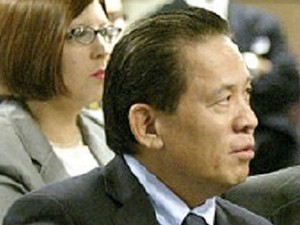Okada group vows to pursue $2B entertainment hub in Manila
MANILA, Philippines — The group of Japanese tycoon Kazuo Okada has affirmed commitment to a $2-billion entertainment hub being developed in the Philippines, adding that it’s finalizing negotiations with a prospective local partner alongside efforts to deal with local land ownership restrictions.
Okada’s Universal Entertainment Corp. issued on Tuesday a statement from Tokyo following reports in the Philippines that the Department of Justice (DOJ) had recommended the filing of charges against 26 people and corporations, including Okada himself, for alleged violation of the country’s anti-dummy laws.
The DOJ cited restrictions under the fundamental law of the land, the 1987 Constitution, which required 60 percent local ownership of land. Foreign investment regulations likewise cap foreign equity in the gaming business at 40 percent, the DOJ stated.
In its statement, Universal Entertainment said it had been “cooperatively” working with the Philippine government’s Officer of the General Counsel (OGCC) since 2012 and was advised it would have “until the completion of the development to resolve the land issue.” “Hence, based on this recommendation we have since sought ways to find an amicable resolution to the problem. Currently, we are already in the final stages of negotiations to secure potential local partners and finding a conclusion to the ownership of land,” the Japanese group said.
Okada earlier lost the group of taipan John Gokongwei as an ally in his upcoming Philippine gaming hub but there are “ongoing” discussions with property tycoon Andrew Tan’s Empire East Land Holdings Inc. Recently asked whether talks have expanded to include ELI’s potential ownership of land where the casino and other components of the project would rise, ELI president Chalemagne Yu had said: “Talks are very preliminary. (They are) really expressions of interest for a joint undertaking in the residential development.
Universal Entertainment, which would operate the project through wholly owned Tiger Resorts, Leisure and Entertainment Inc., said it couldn’t help but “speculate and express concern if there is any direct influence from our civil litigation against Wynn Resorts or the U.S. Federal Bureaus investigation.”
Okada has been accused of making improper payments to Philippine regulators to secure a gaming license.
“We will continue to develop our dream of a fully integrated resort in Manila Bay that will not only create 15,000 stable jobs for the country but together with the Philippine people, attract international recognition and guests from all over the world,” the company said.
Okada’s company said it received the proposal for the Pagcor Entertainment City in Manila Bay in 2007, during which it submitted its bid and plan for the project.
“Being a foreign company, we were not yet familiar with Philippine government laws and ordinances so we sought out legal counsel to guide our planning and development from the largest and most prominent law firm in the Philippines,” the Japanese group said.
The land was acquired in Manila Bay in 2008 under Philippine laws based on the advice of its legal counsel, the group said.
But in 2010, the company said the Office of The President of the Philippines had presented a new interpretation to the Grandfather Rule of foreign real property ownership laws.
The so-called grandfather rule puts weight on the nationality of the stockholders in determining the nationality of a corporation or its compliance with laws on foreign equity limits.
An amicable solution is now being discussed and talks are being finalized with a prospective local partner, according to the group.

